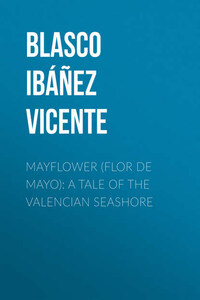CHAPTER I
THE WIDOW'S TAVERN
The morning of that day – it was a Tuesday of the Lenten season – could not have dawned more promisingly. The sea, off the Cabañal, was in flat calm, as smooth as a polished mirror. Not the slightest ripple broke the shimmering triangular wake that the sun sent shoreward over the lifeless surface of the water.
The fishing fleet had headed, bright and early, for the grounds off the Cabo de San Antonio; and all the seines were out to take full advantage of the perfect weather. Prices on the market of Valencia were running high; and every skipper was trying to make a quick catch and get back first to the beach of the Cabañal, where the fisherwomen were waiting impatiently.
Toward noon the weather changed. An easterly wind came up, the dread levante, that can blow so wickedly in the gulf of Valencia. The sea at first was lightly wrinkled; but as the hurricane advanced the placid looking-glass gave way to a livid menacing chop, and piles of cloud came racing up from the horizon and blotted out the sun.
Great was the alarm along shore. In the eyes of those poor people, familiar with all the tragedies of the sea, wind from that quarter always meant one of those storms that bring sorrow and mourning to the homes of fishermen. In dismay, their skirts whipping in the blow, the women ran back and forth along the water's edge, wailing and praying to all the saints they trusted. The men at home, pale and frowning, bit nervously at the ends of their cigars, and, from the lee of the boats drawn up on the sand, studied the lowering horizon with the tense penetrating gaze of sailormen, or nervously watched the harbor entrance beyond the Breakwater on whose red rocks the first storm waves were breaking. What was happening to so many husbands and fathers caught with their nets down off shore? Each succeeding squall, as it sent the terrified watchers staggering along the beach, called up the thought of strong masts snapping at the level of the deck and triangular sails torn to shreds, perhaps at that very moment!
About three o'clock on the black horizon a line of sails appeared, driving before the gale like puffs of foam that vanished suddenly in the troughs of the waves to dart back into view again on the crests succeeding. The fleet was returning like a frightened herd in stampede, each boat plunging in the combers with the bellow of the tempest upon its heels. Would they make the lee of the Breakwater? The wind in devilish playfulness would here tear off a shred of canvas, there a yard, and there a mast or a tiller, till a rudderless craft, caught abeam by a mountain of greenish water, would seem surely to be swallowed up. Some of the boats got in. The sailors, drenched to the skin, accepted the embraces of their wives and children impassively, with vacant and expressionless eyes, like corpses suddenly resurrected from the tomb.
That night was long remembered in the Cabañal.
Frenzied women, with their hair down and lashing in the hurricane, their voices hoarse from the prayers they shouted above the howling gale, spent the whole night on the Breakwater, in danger of being swept off by the towering surf, soaked with the brine from the biting spray, and peering out into the blackness as though bent on witnessing the lingering agony of the last stragglers.
Many boats did not appear. Where could they be … ay Diós, Diós! Happy the women who had their sons and husbands safe in their arms! Other boys were out in that tumbling hell, driving through the night in a floating coffin, tossing from white cap to white cap, dizzily plunging into the yawning trough, while decks groaned beneath their feet, and gray hills of water curled above to break down upon them in a destroying surge!
It rained all night long. Many women waited out till sunrise, drawing their soaked cloaks about their shivering bodies, kneeling in the black mud and coal-dust on the Breakwater, shrieking their prayers to be sure that God would hear, or, again, in desperate rage, stopping to tear their hair and hurl the most frightful blasphemies of the Fishmarket up toward heaven.
And when dawn came, what a glorious dawn it was! As if nothing at all had happened, the sun lifted a smiling hypocritical face above the line of a clean horizon, and spread a broad uneasy glitter of golden beauty over waters that peacefully carried long streaks of foam from the night's turmoil. The first thing that the rays of morning gilded was the battered hulk of a Norwegian barkentine ashore off the Beach of Nazaret, its nose buried in the sand, its midships awash, its bilges agape and in splinters, while strips of canvas floated from the rigging tangled about the broken masts.
The ship had carried a cargo of Northern lumber. Pushed gently along by the lapping waves, timbers and boards were slowly drifting ashore, where they were dragged out by swarms of black ants and disappeared as though sunk in the sand. And they worked hard, those ants. The storm was just what they had been waiting for. Beach-pirates were whipping up their horses gayly along all the roads leading to the








